Iran Launches Office In Syria’s Hasakah To Recruit Militia
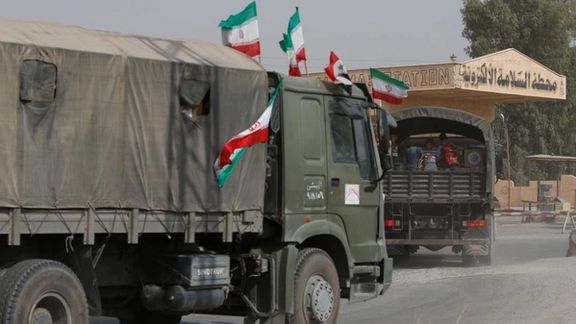
The Islamic Republic has opened an office in Syria’s northeastern Hasakah province to recruit young locals to join its proxies.

The Islamic Republic has opened an office in Syria’s northeastern Hasakah province to recruit young locals to join its proxies.
Offering vulnerable young men a monthly salary of $200, The Syrian Observatory for Human Rights reported that the Islamic Republic is on a new drive to recruit militants from one of the region’s poorest countries.
It claimed that 80 men are working voluntarily in the office, part of the Islamic Republic's efforts to expand its military and political influence in Syria.
Reports from the rights group claim that in November, the Lebanese proxy Hezbollah, Iran’s most powerful regional militia, destroyed vegetable warehouses in Damascus and turned them into military headquarters of Iran-affiliated proxies.
In December, Asharq Al-Awsat also reported that militants affiliated to the Islamic Republic are seeking to buy land and real estate in the southern suburbs of Damascus with the aim of expanding Iran's influence near the Syrian capital.
The newspaper claimed that there is a renewed campaign to purchase homes and establish new camps in areas adjacent to the zones of influence of Russia while Iran tries to deepen its influence while Russia is preoccupied with its war in Ukraine.
There are also claims that the Iranian militias have confiscated properties from people across other regions of Syria. In 2021 The Observatory reported that the IRGC and its militias have confiscated 10 houses and 30 shops in the city of al-Mayadin in the eastern suburbs of Deir ez-Zor, claiming that their owners are opponents of Bashar al-Assad's government.
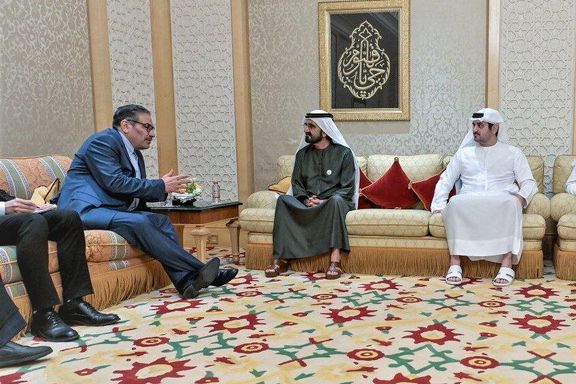
Iran will push forward at rapid speed as it forges better relations with its Arab neighbors following the recent agreement to restore ties with Saudi Arabia, according to the regime.
In a glowing article published Friday, IRNA, the state news agency, portrays the agreement with Saudi Arabia, signed a week ago in Beijing, as a historical event that heralds a new era in the Middle East.
Iran’s national security chief Ali Shamkhani, an old IRGC hand, visited the United Arab Emirates Thursday and met with members of its top leadership. However so far, there is no concrete information about details of the discussions in UAE and Iranian media.
IRNA, however, said the visit shows that once Tehran and Riyadh embark on rapprochement, Saudi allies would follow and “foreign influence” will be reduced in the region, implicitly referring to the United States.
Shamkhani met with UAE President Sheikh Mohammed bin Rashid and ruler of Dubai and other top officials Thursday. “Their talks covered regional and international issues of mutual concern, and the importance of working to support peace and co-operation in the region to enable progress and prosperity for its people,” state news agency Wam reported.
Iranian media have hinted that Shamkhani’s agenda included discussions with the UAE to help Iran overcome some of the impact of US economic sanctions, as the regional trade and banking hub.
Iran has already been using middlemen and contacts in the UAE to facilitate its illicit oil trade and money laundering efforts. But any official commitment by the UAE is hard to imagine given the potential violation of US sanctions.
Reuters quoted two unnamed Iranian officials Thursday as saying that last September, Iran's Supreme Leader Ali Khamenei lost patience with the slow pace of bilateral talks with Riyadh and summoned his team to discuss ways to accelerate the process, which led to China's involvement.
This would mean a complete about-face by Khamenei whose zealous followers attacked the Saudi embassy in Tehran in January 2016, an incident that led Riyadh to cut diplomatic ties.
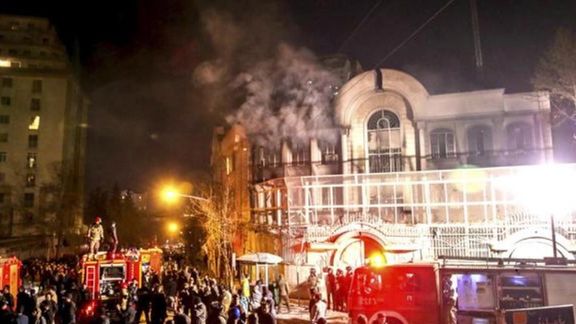
Khamenei and other senior clerics have over the years repeatedly castigated the Saudi ruling family as lackeys of the United States who were harming the interests of Muslims. Khamenei has so far been silent on the agreement with Riyadh, but he is scheduled to address the nation next Tuesday on the Iranian New Year, Nowruz.
Other reports have indicated a more forceful Chinese role in persuading Tehran to offer guarantees to Riyadh to facilitate normalization.
The Wall Street Journal reported Friday that Tehran has pledged not to send arms to Yemen’s Houthis who have been fighting Saudi-led forces for nearly a decade, quoting US and Saudi officials.
Yemen is clearly the most immediate issue the Saudis want to see resolved, as without Iran’s military backing, the Houthis have to show flexibility and perhaps conclude a peace agreement in the war-torn country.
An interesting part of the report by IRNA is the reference to popular protests that erupted last September after the death of Mahsa Amini in ‘hijab police’ custody. IRNA says that good relations with neighbors will help derail enemy plans to destabilize the Islamic Republic, repeating accusations that protests were part of a Western conspiracy.
It also emphasizes the need for a “rational” foreign policy, a term so far used by critics of the hardliners in full control of the government. It says the deal with Saudi Arabia and Shamkhani’s trip to the UAE can help calm the domestic political scene. These comments clearly show how far the regime has been shaken by the popular protests and how extending a hand to its Arab neighbors is now more a necessity than choice.
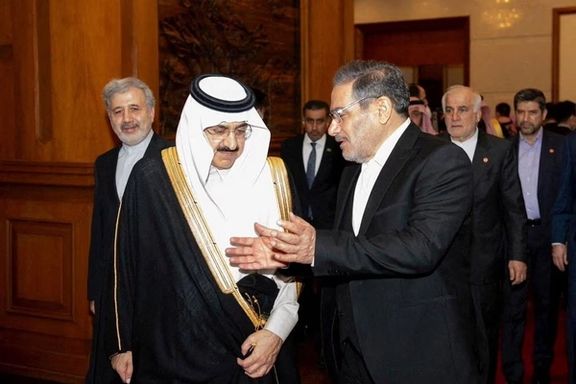
Iranian media are highlighting the role of Iran’s Security chief Ali Shamkhani, a military man, in normalizing ties with Saudi Arabia and other Persian Gulf states.
The media is using the term “field diplomacy” to describe the role the military can play in securing diplomatic outcomes, because Shamkhani was a long-time senior IRGC officer and navy commander with the rank of Admiral. The term is also used to highlight the use of the military in achieving diplomatic objectives, which in this context is IRGC’s regional power projection.
Hardline daily Vatan Emrooz which speaks for the ultraconservative Paydari Party and conservative Bultan [Bulletin] News which is close to parliamentary speaker Mohammad Bagher Ghalibaf first used the term this week after a deal was reached in Beijing to restore diplomatic relations with Riyadh.
The term ‘field diplomacy’ was first used by former foreign minister Javad Zarif when IRGC Qods (Quds) Force commander Qassem Soleimani circumvented the Foreign Ministry and brought Syrian President Bashar Assad to Tehran for a meeting with Supreme Leader Ali Khamenei in February 2019.

At the time, Zarif was so deeply annoyed by the IRGC's intervention, and not even inviting him to the meeting that he resigned, but Khamenei did not approve the resignation. Zarif later once again used the term about IRGC's intervention in foreign policy in a leaked interview that put an end to his career.
Vatan Emrooz, portrayed the Tehran-Riyadh agreement as a victory for Shamkhani and ‘field diplomacy’ and even extended this victory from the realm of foreign policy to the area of economy as Shamkhani went to Abu Dhabi for a diplomatic and economic mission on Thursday. The media in Tehran said that he will be seeking the United Arab Emirates' cooperation in circumventing US sanctions, particularly the ones that have largely hindered Iran's oil exports and international banking since 2018.
However, it is not yet clear how the UAE can cooperate with Iran as long as US and other international sanctions against Tehran are in place.
Iran and the UAE have recently raised the level of their diplomatic relations from the charge d'affairs level to the ambassadorial and have named their new chief diplomats. The hardliner media said that the UAE welcomes the breakthrough in the Iran-Saudi ties as it will eliminate the threat from Yemen where Houthis last year launched the first attack on Abu Dhabi in the history of the Emirates.
Vatan Emrooz added that Iran, on the other hand looks at the UAE as the Hong Kong of West Asia and a hub that can facilitate international banking operations for Iran. Only the future can show how realistic those security and financial hopes are.
The report in Bultan News, used the term field diplomacy with some caveat. Its headline said, "The agreement with Saudi Arabia was the outcome of a realistic union between field diplomacy and foreign diplomacy," although it is clear from all Iranian and international reports that Iran’s Foreign Ministry and the minister, Hossein Amir-Abdollahian had no part in making the long-awaited deal.
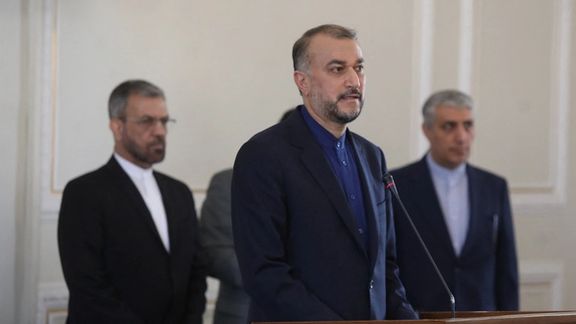
The website also stressed that it was the achievements of the Iranian military and nuclear scientists that were used as leverage to change regional developments in Iran's interest. This is clearly a reference to Iran's possible attempt to get closer to developing nuclear weapons.
In the meantime, while observers have asked both sides to act cautiously and calmly, some hardliners, including military officials appear to be going too far in their ambitions. IRGC's PR Chief Ramezan Sharif told ILNA News Agency in Tehran about the far-reaching impact of the deal between Tehran and Riyadh.
Sharif was quoted as saying, "The next Qods day ceremony in Iran on April 21 will bring about the end of the Abraham Accord between Israel and Arab nations."
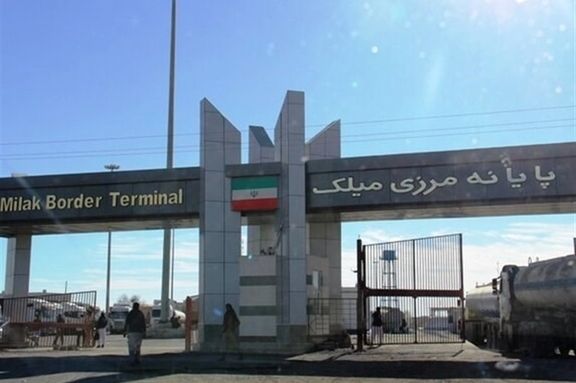
Iranian border guards have reportedly killed at least 11 Afghan citizens including three minors who had illegally crossed into the southeastern Sistan-Baluchestan province.
According to Afghanistan International, the bodies of the Afghan citizens, who were gunned down earlier this week, have been handed over to Taliban forces at Nimroz border crossing on Wednesday.
According to informed sources, these people were planning to enter Iran illegally on Saturday when the Iranian border guards opened fire on them.
Afghan news websites say those killed were all young Afghans from the southwestern Nimroz province.
So far, neither Taliban officials nor the Islamic Republic officials have commented on the tragic event.
In the past 11 months, the bodies of 470 Afghan immigrants, who were killed for various reasons, especially traffic accidents, have been transferred to Afghanistan.
After the Taliban's takeover of Afghanistan in 2021 and the spread of poverty and unemployment in the country, a large number of Afghans have migrated to Iran and Pakistan. Fear of Taliban reprisals and violence also prompt many people to flee.
Iranian border guards have beefed up their control on the long border with Afghanistan to prevent the influx of migrants.
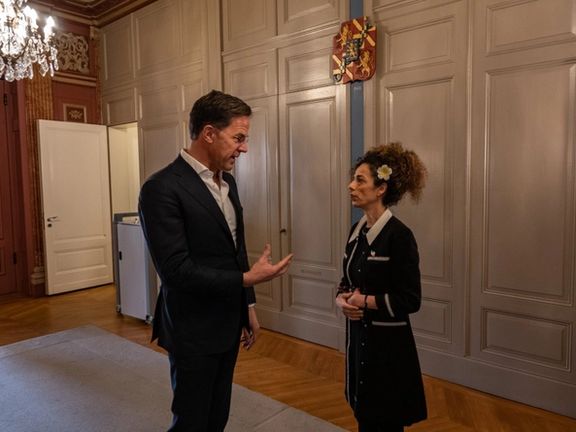
Well-known Iranian-American civil activist Masih Alinejad has urged the Dutch prime minister to designate the Islamic Revolutionary Guard Corps (IRGC) as a terrorist organization.
Alinejad said in a tweet on Thursday that she urged Mark Rutte during their meeting to isolate the Islamic Republic and instead of meeting with regime officials, meet with the coalition of opposition forces.
“We the people of Iran deserve to have a secular democracy like the one you have in Netherlands. Our demand is simple: democratic countries should support pro-democracy movements instead of trading with our killers,” added Alinejad.
She went on to say that she informed Prime Minister Rutte of the torture and rape of minors in the prisons of Islamic Republic.
In another tweet she stated, “I hope all democratic leaders support the pro-democracy movements. A secular democratic Iran will make the world a much safer place. We have to stop the Islamic republic from raping, torturing and killing teenagers for demanding Freedom.”
In response, the Dutch prime minister told Alinejad that many countries in the EU are in favor of sanctioning IRGC and that he is working on the matter.
Despite the adoption of a resolution in the European Parliament to designate the IRGC as a terrorist group. The Revolutionary Guard, which is a military and intelligence force, playing the main role in suppressing Iranians, is not still recognized by the European Union as a terrorist group. The United States designated the group as a Foreign Terrorist Organization in 2019.
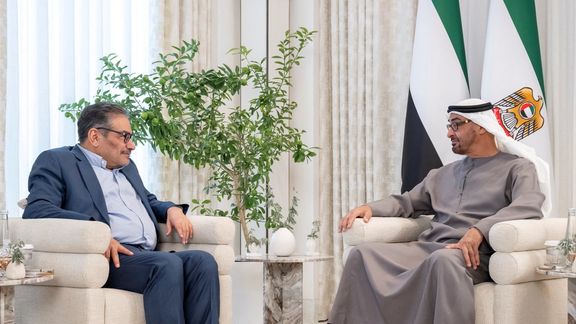
Iranian media appear to be upbeat about the possibility of further breakthroughs in Iran's relations with its Arab neighbors around the Persian Gulf.
Reformist daily Shargh wrote in a commentary headlined, "A season to end disputes" that reports have been coming in since mid-day March 10 when China brokered a deal between Tehran and Riyadh to resume diplomatic ties.
An Iranian parliamentary delegation met with Bahraini counterparts in Manama on Saturday, and Iranian Security Chief Ali Shamkhani visited the United Arab Emirates on Thursday. Manama severed its ties with Tehran one day after Saudi Arabia cut its diplomatic relations in 2016.
Russian sources observed that while the deal with Saudi Arabia was brokered by China as mediator, attempts to improve ties with Bahrain and the UAE are being made through bilateral negotiations.
Officials in Bahrain have attached high importance to restoring ties with Tehran which are likely to start by resuming flights between Tehran and Manama, Shargh newspaper in Tehran wrote. It quoted Iranian West Asia watcher Hossein Amiri as saying that "Saudi satellite countries" including Libya, Maldives, Egypt and Jordan might follow suit soon. The expert told Shargh that the moves signal a new chapter in Iran's foreign policy which is now focused on regional détente.

Shargh also noted that an end to the war in Yemen is the beginning of an end to conflicts and tension in the region. In two weeks’ time, everyone in the region will remember the 9th anniversary of the war in Yemen. Iranian diplomat Ali Asghar Khaji told a visiting UN official in Tehran earlier this week that the Islamic Republic has always said that there is no military solution to the conflict in Yemen.
Mohammad Saleh Sadri, another expert on regional affairs, told Shargh that although all previous efforts to end the conflict in Yemen have failed, the agreement between Tehran and Riyadh has changed the situation. Nonetheless, he added that ending the war is no easy task.
Meanwhile, Arab media in London have pointed out that Egypt might be the first country outside the Persian Gulf region to begin to mend its ties with Tehran.
Another reformist daily, Etemad, wrote on Wednesday that Shamkhani hosted by UAE National Security Adviser Tahnoun bin Zayed Al Nahyan in Abu Dhabi, will also discuss the status of efforts to reach a nuclear deal with world powers as well as the issue of sanctions.
The UAE is usually one of the first points of reference for Iran to expand international trade.
However, it is not clear how Abu Dhabi might be able to help Iran with its troubled international trade as long as US sanctions remain in place, although according to some Iranian officials, at times, the UAE has gone out of its way to help Iran circumvent the sanctions.
Some officials in the UAE have said that Shamkhani's visit was planned long before the agreement with Saudi Arabia, but it was delayed as he went to China first to have the deal done.
Iran and the UAE have a long-standing issue over the ownership of three Persian Gulf islands, although the two side are usually reluctant to discuss it. Ironically it was brought up during President Xi Jinping’s visit Saudi Arabia in December and deeply annoyed some Iranians including state officials.
Another Etemad report suggested quoting Amwaj Media that the resumption of ties with Bahrain will be a priority for Manama as after the re-opening of the Saudi embassy in Tehran, possibly in May, Bahrain will be the only regional country without an embassy in Iran.
However, according to Amwaj Media, the two sides do not wish to do much propaganda about the resumption of their ties. The agency quoted an unnamed local official as saying "There is no serious unresolved problem between Bahrain and Iran."